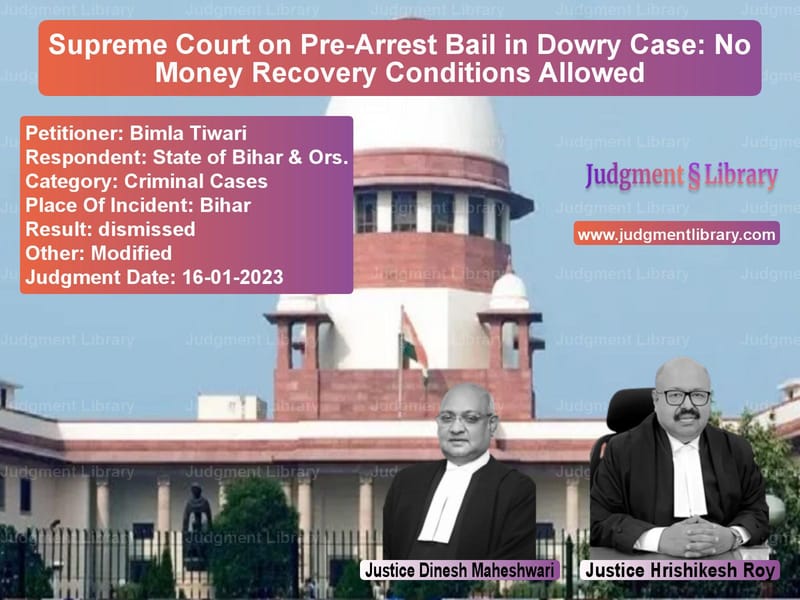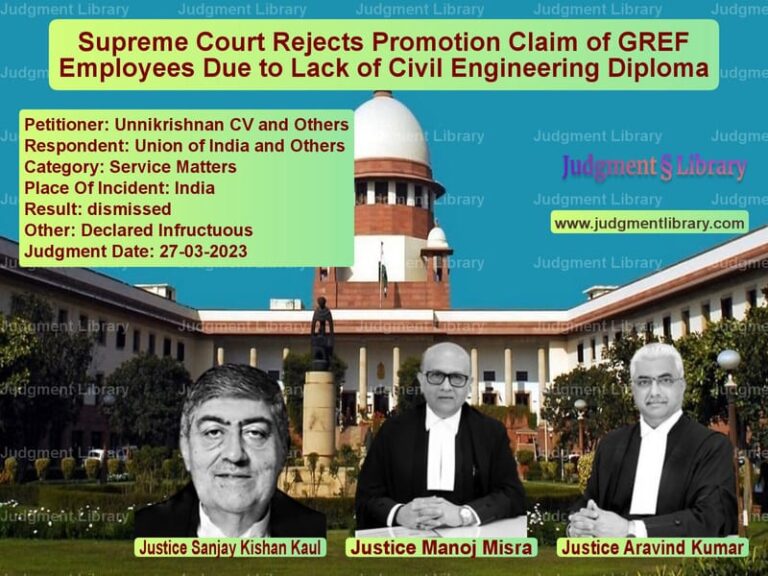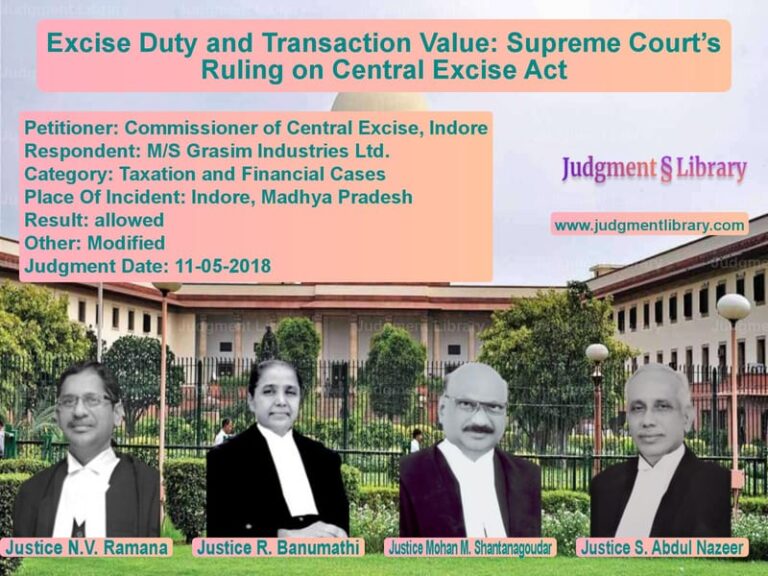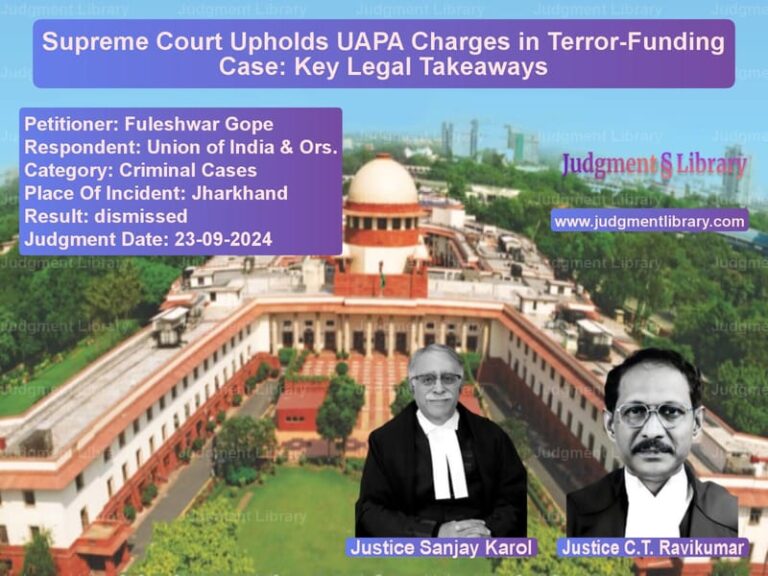Supreme Court on Pre-Arrest Bail in Dowry Case: No Money Recovery Conditions Allowed
The case of Bimla Tiwari vs. State of Bihar & Ors. revolves around allegations of dowry harassment and fraud, and the key issue of whether pre-arrest bail can be conditioned upon monetary settlements. The Supreme Court’s ruling in this case reaffirms the principle that criminal proceedings should not be used as a tool for financial recovery and that bail decisions should be based on legal principles rather than financial considerations.
In this case, the petitioner, Bimla Tiwari, challenged an order by the Patna High Court that granted pre-arrest bail to the accused on the condition that they pay Rs. 75,000 to the petitioner. The Supreme Court upheld the grant of bail but struck down the requirement of payment, emphasizing that criminal law should not be used as a means of coercive financial settlements.
Background of the Case
The case originated from an engagement dispute between the petitioner’s daughter and the son of Respondent No. 2. According to the petitioner, during the engagement ceremony, her husband gave Rs. 6,00,000 in cash to the respondents. Later, the respondents allegedly demanded additional money and a vehicle. When the petitioner refused to comply, the marriage was called off, but the respondents failed to return the money and gifts given during the engagement.
Feeling aggrieved, the petitioner initiated legal proceedings against the respondents, alleging fraud and dowry harassment under Sections 406 and 420 of the Indian Penal Code (IPC) and Sections 3 and 4 of the Dowry Prohibition Act, 1961.
Legal Proceedings and High Court’s Order
The accused initially sought pre-arrest bail, but the request was denied by the Additional Sessions Judge-IV, Patna. A subsequent petition for pre-arrest bail was filed in the Patna High Court, which was also dismissed in 2019. However, in 2022, the respondents approached the High Court again, and this time, their plea for pre-arrest bail was granted with a condition that they pay Rs. 75,000 to the petitioner.
Arguments Presented
Petitioner’s Arguments
- The petitioner opposed the grant of pre-arrest bail, arguing that the accused had been evading legal proceedings and that warrants under Sections 82 and 83 of the CrPC had already been issued.
- It was contended that the accused had illegally demanded dowry and defrauded the petitioner’s family.
- The petitioner argued that granting bail in exchange for a monetary payment effectively turned the criminal case into a financial dispute.
- The petitioner highlighted that the accused had previously attempted to avoid legal consequences by making monetary offers, and such actions should not be encouraged.
Respondent’s Arguments
- The respondents claimed that they had already repaid Rs. 6,00,000 via a bank draft to the petitioner.
- They further contended that they were willing to pay an additional Rs. 75,000 to settle the dispute.
- The respondents argued that they had been falsely implicated in the case and that granting them bail would not hinder the trial.
Supreme Court’s Judgment
The Supreme Court examined whether pre-arrest bail could be conditioned upon a financial settlement. The Court ruled:
- “The process of criminal law, particularly in matters of grant of bail, is not akin to money recovery proceedings.”
- The Court emphasized that criminal law cannot be used for coercion or financial settlements.
- The judgment clarified that a court’s decision to grant bail must be based on legal considerations rather than monetary compensation.
- The Supreme Court upheld the grant of pre-arrest bail but struck down the condition that required the accused to pay Rs. 75,000.
Key Observations of the Supreme Court
The Supreme Court made several critical observations in this case:
- The Court noted that “criminal law cannot be used for arm-twisting and money recovery, particularly while opposing the prayer for bail.”
- The judgment stated that “granting or denying bail should be based on legal principles, not on the ability of the accused to make a financial settlement.”
- The Court reaffirmed that financial transactions between parties in a criminal case should be handled through civil proceedings rather than influencing bail decisions.
Impact of the Judgment
The Supreme Court’s decision in this case sets an important precedent in cases involving financial disputes intertwined with criminal allegations. The ruling establishes that:
- Bail decisions must be independent of financial settlements between parties.
- Monetary transactions should not be used as leverage in criminal proceedings.
- The court’s role in bail proceedings should be to determine whether the accused poses a flight risk or a threat to the legal process, rather than assessing financial compensation.
Final Decision
The Supreme Court dismissed the special leave petition filed by the petitioner but made it clear that monetary settlements should not influence bail decisions. The ruling reinforced that while pre-arrest bail could be granted based on the merits of the case, it should not be contingent on payments to the complainant.
This judgment is significant in reinforcing the principle that criminal law should not be misused for financial recoveries and ensuring that bail decisions are based on legal grounds rather than monetary settlements.
The ruling is expected to serve as a guiding principle for lower courts in cases where financial transactions and criminal allegations intersect. By clarifying that pre-arrest bail should not be conditional on payments, the Supreme Court has reinforced the integrity of bail jurisprudence in India.
Petitioner Name: Bimla Tiwari.Respondent Name: State of Bihar & Ors..Judgment By: Justice Dinesh Maheshwari, Justice Hrishikesh Roy.Place Of Incident: Bihar.Judgment Date: 16-01-2023.
Don’t miss out on the full details! Download the complete judgment in PDF format below and gain valuable insights instantly!
Download Judgment: bimla-tiwari-vs-state-of-bihar-&-ors-supreme-court-of-india-judgment-dated-16-01-2023.pdf
Directly Download Judgment: Directly download this Judgment
See all petitions in Bail and Anticipatory Bail
See all petitions in Dowry Cases
See all petitions in Judgment by Dinesh Maheshwari
See all petitions in Judgment by Hrishikesh Roy
See all petitions in dismissed
See all petitions in Modified
See all petitions in supreme court of India judgments January 2023
See all petitions in 2023 judgments
See all posts in Criminal Cases Category
See all allowed petitions in Criminal Cases Category
See all Dismissed petitions in Criminal Cases Category
See all partially allowed petitions in Criminal Cases Category







